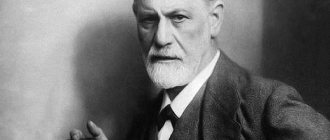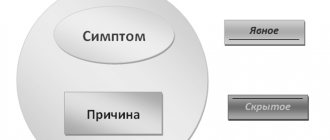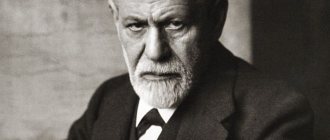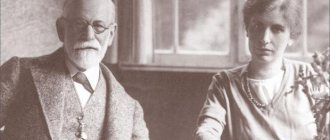The idea that a person’s inner world has a complex structure has existed for a long time. Even philosophers of the era of Antiquity and early Christianity identified three spheres: spirit, soul and mind or reason. Currently, the most popular and at the same time the most developed structure of the psyche is the model of S. Freud. It includes three levels - consciousness, unconscious and superconscious - and is the basis of the theory and practice of psychoanalysis.
Structural model of the psyche of S. Freud
Modern psychoanalysis differs in many ways from the classical teachings of Freud and is not a single entity, but includes a number of areas. However, there is something in common between them. And first of all, these are concepts such as “unconscious” (“id”, “it”), “consciousness” (“I”, “ego”) and “superconsciousness” (“super-I”, “super-ego”) . The interaction of these levels gives an idea of the processes occurring in the human psyche and their impact on his life.
The core of psychoanalysis can be considered the idea of the unconscious. By developing the theory of this area, S. Freud made a real revolution in psychology. However, he was not the discoverer of the concept itself. Back in the 17th century, G. Leibniz wrote about unconscious phenomena in the human psyche. True, from the point of view of modern science, his theory looks rather primitive. It comes down to the statement that the human soul perceives many things that the mind is not able to comprehend.
Taking this idea as a basis, Freud not only described in detail the functions of consciousness and the unconscious, but also identified another level, standing above consciousness and formed under the influence of society. This is the “super-ego” or superconsciousness. In a simplified form, it can be characterized as conscience or a set of social attitudes that influence human behavior and limit the manifestation of animal instincts and desires.
Each of these three levels or spheres performs its own functions in the human psyche.
Interaction of Id, Ego and Superego
It turns out that there are so many competing forces that a conflict may arise between the Id, Ego and Superego. Freud used the term "ego strength" to refer to the ability of the ego to function regardless of what relationships exist between these components at the time. A person with a strong ego is able to effectively cope with such stress, and those with an overly strong or, conversely, weak ego may become too unyielding or too weak-willed. As Sigmund Freud believed, the key to a healthy personality is the balance between the id, ego and superego.
Sources: psychology.about.com Carducci, B. The psychology of personality: Viewpoints, research, and applications. John Wiley & Sons; 2009. Engler, B. Personality theories. Boston: Houghton Mifflin Harcourt Publishing; 2009.
Tags: , personality, behavior, superego, theory, ego
Have something to say? Leave a comment!:
The unconscious, or "it"
S. Freud called this level id, which can be translated from Latin as “this” and “something”, and in Russian psychology the concept “it” is more often used. The founder of psychoanalysis considered the unconscious to be the most important area of the psyche. It is innate in nature and is subject to biological, not social laws, because instincts and natural, mainly sexual, needs play a significant role in this area.
In many ways, the content of “it” is determined by hereditary factors. By the way, one of Freud’s followers, K. Jung, believed that the level of the unconscious is also connected with the ancestral memory of the ethnic group, and the archetypes of the collective unconscious are stored there - the most ancient prototypes that we inherited from our distant ancestors.
The content of the unconscious is quite diverse, and at this level there are not only archetypes, but also many other mental formations:
- instincts;
- natural, primarily sexual needs;
- asocial (forbidden) desires repressed from the level of consciousness;
- aggressive impulses and desires to dominate;
- psychological complexes resulting from the unrealized energy of forbidden desires.
From the point of view of psychoanalysis, it is “it” that largely controls human behavior. If anything, most of the behavioral problems and communication difficulties we experience are related to this level. The whole point is that the unconscious is, as it were, focused on obtaining pleasure at any cost, and society introduces its own, often quite strict, restrictions into this process.
Superego
The last component that develops in personality is the Superego. The superego is the aspect of personality that contains all of our internalized morals, values, and ideals. These we receive from both parents and society, they make up our sense of right and wrong. The superego contains the framework within which we make decisions. According to Freud, the superego begins to emerge around the age of five. The superego consists of:
- Ego ideal , which includes limits, rules, and standards of good behavior. These are actions that would be approved by parents or others with sufficient authority for the person. By following these rules, a person is filled with a sense of pride in himself, he realizes his value to others and feels inner integrity.
- Conscience includes information about what, from the point of view of parents and society, would be unacceptable. Such behavior is often prohibited and can lead to unpleasant consequences, punishment, or feelings of guilt and remorse.
The superego is aimed at creating more perfect and civilized behavior. It tries to suppress all unacceptable urges of the id and force the ego to act according to idealistic standards rather than realistic principles. The superego is present in the conscious, preconscious and subconscious.
"Ego" - "I"
To denote the level of consciousness in psychoanalysis, the Latin concept ego is used - “I”. If the “id” is the animal nature, then the “ego” is the rational part of the psyche. These are all things that we are aware of, that we can manage and meaningfully regulate. Strange as it may seem at first glance, the volume of the “ego” is not too large compared to the “id”; the sphere of the conscious is much smaller than the region of the unconscious.
Although S. Freud himself paid less attention to the analysis of this level, its functions are not difficult to determine. These include the following:
- assessment of the real situation;
- analysis of meaningful information received by consciousness from external and internal sources;
- making decisions;
- control over their implementation;
- partial understanding of desires and transforming them into actions or moving them to the level of the unconscious (displacement);
- rationalization (explanation) of actions and actions.
In fact, the “I” is a mediator in the struggle between the “it” and the “super-ego”. This level of the psyche is constantly looking for a compromise between natural needs and the demands of society.
Formation
The structure of the Super-Ego is formed thanks to the social name of a person (Last Name, First Name, Patronymic), which is recorded in a passport or other identity document. For example, stateless persons or those with identification problems cannot become full-fledged members of society.
A person’s personal name determines the harmony of his Super-Ego. Any change of full name inevitably leads to a change in the structure of the personality component, and therefore changes the social conditions of a person. The correct choice of name is an important condition for harmonious relationships between society and the individual.
"Super-ego" or "super-ego"
Superego is a kind of superstructure over consciousness, which is formed during a person’s life under the influence of social norms, requirements, prohibitions - taboos. On the one hand, the “superego” allows us to distinguish between good and evil, good and bad, and to be aware of moral principles and ideals. But on the other hand, according to Freud, the “super-ego” limits a person’s freedom, driving him into the framework of generally accepted norms. Moral prohibitions prevent the satisfaction of natural needs and the manifestation of equally natural aggressiveness. This leads to various mental problems, such as neuroses.
To avoid a critical situation, a person’s consciousness, his “I”, invents various methods of compensation or sublimation - transforming the energy of forbidden desires into something more acceptable to society.
Eid
The id is the only component of personality that a person has from birth. This aspect is completely unconscious and involves instinctive and primitive forms of behavior. According to Freud, the id is the source of all psychic energy, making it a fundamental component of the personality. The id functions in accordance with the pleasure principle - because of it, a person strives for immediate satisfaction of all his desires and needs. If these needs are not met on time, a state of anxiety or tension arises. For example, increased hunger or thirst will be followed by an attempt to eat or drink. The id plays a very important role early in life as it ensures that the infant's needs are met. If a child is hungry or uncomfortable, he or she will cry until the demands of the id are met. However, immediate satisfaction of these needs is not always even possible. If we were governed solely by the pleasure principle, then at some point we might realize that in order to satisfy our needs, we snatch things we like from the hands of other people. Such behavior would be destructive and socially unacceptable. According to Freud, the id attempts to relieve the tension created by the pleasure principle through a primary process involving the formation of a mental image of a desired object as a way of satisfying a need.
Manifestation
So, the Super-Ego is the social shell of the personality. The minds of many people are not active, and they perceive the surrounding reality not with their own, but with the collective mind. That is, a person’s personality is labeled as Super-Ego. This label is a criterion for how a person will be treated by society.
That is, if the Super-Ego is disharmonious, the reaction of others to the person will be negative. A person with a harmonious Super-Ego will always be understood, normally perceived and supported by others.
The negative reaction of society absorbs a huge amount of personal power and creates an uncomfortable and unpleasant environment around the person.
Managing your life
In order to achieve balance in the manifestation of the influence of the ego in our lives, we must follow a few simple rules:
- determine your own criteria for success and methodically move towards it;
- don’t be a complete outsider, trying to swim against the current just for the sake of doing something contrary;
- you should understand that the majority does not exist, there is only a specific person with whom you should interact;
- anger and negativity must be transformed into creativity;
- energy should not be spent on disappointment, but on the creative act.
How to detect influence
Selfish people are proud, vain, thirst for power and self-interest, aggressive competition. Their faithful companions are resentment, jealousy and envy. Passive egoists are cowardly, lazy, deceitful and hate others.
Getting rid of selfishness
It comes in two types: rational (sound) egoism and hedonism. Rational selfishness does not involve harming other people. To show your own individuality, there is no need to infringe on other people in any way. At the same time, hedonism is selfishness that causes harm to others. He is aimless, devoid of effectiveness. It is hedonism that requires its elimination or the search for a balance between it and healthy egoism.
Important! The main advice to help get rid of hedonism: “Do to people as you want them to do to you!”
Find out how to get rid of constant feelings of fear and anxiety.
Fame
The talented performer was noticed. Already in 2010, his first full-fledged solo concert took place in Yerevan at the Opera club. Recordings from the concert were broadcast on the MuzTV channel, after which the performer’s popularity increased sharply.
Edgar chooses his creative pseudonym EGO.
In 2012, he took an active part in the “Bravo, Armenia” project. At this competition, Edgar receives the audience award and takes first place.
Until 2015, Edgar appeared little in public and practically did not give concerts. This is due to the fact that he devoted all his time to writing new songs and working in the studio. After 2015, he resumes concert and touring activities. His creative schedule is scheduled for many months in advance. His immediate goal is a large tour of the Caucasus republics. He has already managed to give concerts in Ossetia and Kabardino-Balkaria and is not going to stop there.
The rapper posts his new works on his Instagram page. He asks listeners to rate them and share their impressions. This helps him understand how well the work was done and what the viewer wants from him.
How to disobey your EGO?
EGO is not always a good helper to us. Often, while protecting us from everything new and unknown, it does us a disservice. We stop developing, and, despite the fact that sometimes we don’t like our life, we are unable to change anything. And we blame circumstances or ourselves for this.
Experiencing feelings of guilt or resentment for external circumstances is not the best way to change and change your life. Prolonged stay in such a situation can contribute to apathy (opens in a new tab), depression and the development of psychosomatic diseases.
In order to learn to live a full life, develop, learn and accept something new all the time, you should become aware of your EGO, its manifestations in your life and its influence when making important decisions.
You need to understand that the EGO is based on beliefs, most of which were formed in early childhood, under the influence of parental attitudes or personal experience.
Many beliefs, while playing a positive role at some stage in your life, are not as useful or necessary in the present. They can be restrictive or harmful.
By learning to hear your true Self, you will be able to follow your inner voice and act in accordance with your true goals and needs. Your EGO will stop controlling you. You will no longer have the feeling that you are not living your life.
You will learn to be yourself and find inner peace.
Conclusion
I hope you now understand what EGO is and how it manifests itself. If you liked the article, share it with your friends or leave your comment.
If you are unable to deal with your EGO (beliefs) on your own, we can work through this in my consultation sessions. Sign up and come!
P.S. Take a look at FREE, there might be something useful for you.
Ego in psychoanalysis by Carl Jung
In the analytical psychology of K. Jung, the ego is understood as a complex that includes the entire contents of consciousness, included in the structure of the psyche along with the unconscious, consisting of the personal and collective unconscious. “It is a complex of data constructed primarily by general awareness of one’s body, one’s existence, and then by memory data; a person has a certain idea about his past existence, certain sets (series) of memory. These two components are the main constituents of the EGO. Therefore, we can call the EGO a complex of mental factors. This complex has enormous attractive energy, like a magnet; it attracts contents from the unconscious, from this dark unknown region; it also attracts impressions from the outside, and when they come into contact with the EGO, they are realized.”
I am you, you are me
Another concept that is associated with the concept of ego is the alter ego or alternative ego. In simple words, an alter ego is a split personality. There are several types of alternative ego:
- feminine, when a man clearly exhibits qualities characteristic of the feminine principle, which he considers his second true manifestation;
- masculine: a woman believes that her second “I” is masculine;
- dark: manifested in the uncontrolled use of obscene language, unpleasant character, selfishness, bad habits;
Photo by Matúš Kovačovský on Unsplash
- identifying oneself with fictional heroes, characters from books, films.
Creation
The rapper quite often mixes different styles of music. The timbre of his voice can be described as somewhat hoarse. Fans claim that, having heard EGO’s work once, it will be impossible to confuse his style of performance with someone else.
“Fierce High” is EGO’s most popular album to date. The song “She’s the Bomb” is currently very well known among his listeners.
EGO is an ardent fan of literature and poetry. He is inspired by such poets as Rasul Gamzatov, Eduard Asadov, Robert Rozhdestvensky. After reading their poems, his song lyrics are written many times better and more productive. His mother, a teacher of Russian language and literature, instilled in him a love of literature. She also approved his choice of profession in favor of creativity and a musical career.









